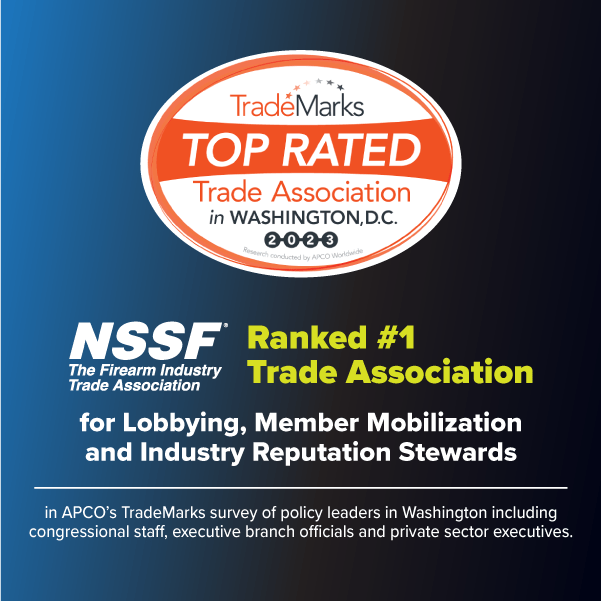 Back to News
Back to News
May 16, 2025
Behind State-Level Momentum, Federal Anti-Credit Card Tracking Code Legislation Moves Forward
Last month, Arkansas Gov. Sarah Huckabee Sanders signed into law HB 1509, the Second Amendment Financial Privacy Act, bringing the total number of states with similar laws to 20. It’s a significant and positive development. The Second Amendment Privacy Act legislation – similarly titled in other states – prohibits financial institutions, credit card companies and payment processors from using a firearm retailer-specific Merchant Category Code (MCC) to track firearm and ammunition purchases. NSSF was the first to call foul on the MCC creators and supporters back in 2022 and has been at the forefront of bringing these protections to gun and ammunition purchasers.
Now there’s even greater momentum – and a more favorable political landscape – for the federal legislation in the same vein that would block activist banks and gun control allies from tracking and denying purchases at firearm retailers made by law-abiding Americans exercising their Second Amendment rights.
Fair Winds at Federal Level
Legislation to prohibit the use of a firearm retailer-specific MCC code was first introduced during the 118th Congress (2023-2024) by then-House Republican Conference Chair Elise Stefanik (R-N.Y.) and U.S. Sen. Bill Hagerty (R-Tenn.) in the Senate. However, even with a pro-Second Amendment majority in the lower chamber, the Senate was led by anti-gun Senate Majority Leader Chuck Schumer (D-N.Y.), with President Joe Biden occupying 1600 Pennsylvania Avenue. There was little realistic chance for the bill to be enacted.
However, with the new 119th Congress, the winds have shifted considerably. Rep. Riley Moore (R-W.V.) introduced H.R. 1181, the Protecting Privacy in Purchases Act, in the House of Representatives in February. That bill already has 118 co-sponsors. In the Upper Chamber across the Capitol, Sen. Bill Hagerty (R-Tenn.) once again reintroduced his bill (S. 1715) and it already has 16 Senate cosponsors.
With President Donald Trump, who who has vowed to protect Second Amendment rights, in The White House, the prospects have never been better for federal protections against this anti-privacy, anti-Second Amendment folly pushed by gun control activists and “woke” supporters in banking board rooms.
The momentum for prohibiting the MCC code being applied to firearm retailers is crescendo-ing at the exact right time. Revealing that monitoring, tracking and controlling the purchases of law-abiding Americans is exactly the point of the MCC code, gun control ally Rep. LaMonica McIver (D-N.J.) recently introduced H.R. 2948, the so-called Safer Neighborhoods Gun Buyback Act of 2025. Hidden away deep in the legislative text, though, is a specific provision to implement a firearm retailer-specific MCC code on prepaid gift cards “for the purpose of preventing the cardholder from using it to purchase a gun or ammunition.” This code is about control.
Laboratories of Democracy Leading
Gov. Huckabee Sanders is just the most recent governor to enact anti-MCC legislation, but several of her colleagues have proven their Second Amendment privacy bona fides over the past few years. There are now currently 20 states where laws prohibiting the implementation and use of a firearm retailer-specific MCC code have been enacted. Arkansas joined Idaho, Montana, Utah, Wyoming, Texas, North Dakota, South Dakota, Iowa, Louisiana, Mississippi, Alabama, Tennessee, Kentucky, Indiana, Ohio, West Virginia, Georgia, Florida and New Hampshire all block the use of the code. In addition to those states with laws on the books, Arizona, Oklahoma, Nebraska, Missouri, Wisconsin, South Carolina, North Carolina and Maine all have pending legislation to do the same.
Only California, Colorado and New York have passed laws that mandate the use of the firearm retailer MCC code. Delaware, New Jersey and Connecticut are currently considering implementing the code in their states.
The variation across the states – and overwhelming disproval of such a code – is the reason why large credit card companies decided to “pause” implementation of the code, just a few short months after the code was created in the first place. The swift and decisive action taken by pro-Second Amendment, pro-firearm industry state legislatures and governors made the difference.
In March 2023, major banks announced they were halting putting the code in place. Reuters reported a Mastercard representative stated via email that mandates to use MCCs for firearm and ammunition purchases would cause “inconsistency” in how the code could be applied by merchants, banks and payment networks, given the number of states that now ban their use. “It’s for that reason that we have decided to pause work on the implementation of the firearms-specific MCC,” the Mastercard representative told Reuters.
American Express and Visa representatives also cited state bills as driving their decisions. “There is now significant confusion and legal uncertainty in the payments ecosystem, and the state actions disrupt the intent of global standards. Accordingly, Visa is pausing implementation of the MCC,” Visa said in an emailed statement at the time.
NSSF celebrated those decisions but has always remained vigilant against future legislative actions.
Flawed Approach
As with many half-baked ideas that come from gun control activists, the firearm retailer-specific MCC is among the most flawed ideas to be considered as a way of seriously and soberly addressing criminal firearm misuse. Even banking executives realized this when the idea was first proposed by The New York Times columnist and gun control supporter Andrew Ross Sorkin.
In response to Sorkin’s pie-in-the-sky gun control suggestion, Bloomberg News – the media juggernaut created by gun control-loving billionaire Micheal Bloomberg – reported the proposal would have little meaning.
“The payment network and its banking partners would have no idea if a gun-store customer is purchasing a [firearm] or safety equipment,” Bloomberg News reported.
Even banking executives knew it was a ruse. Visa CEO Al Kelly cast doubt on the MCC idea right away. Kelly admitted flat out the code doesn’t work as gun control activists dream it would. “If [Visa’s Chief Communications Officer] K.C. Kavanagh goes into a gun store and buys three thermoses and a tent, and you go in and buy a rifle and five rounds of ammunition, all I know is you both went to the same gun store… But I don’t know what you bought.”
The explanation speaks for itself. The MCC code is about gun control and invading the privacy of law-abiding Americans – nothing more. It won’t solve crime. It won’t prevent crime. And it won’t protect the sensitive and private personal information of Americans.
The states have led the way thus far. Now, it’s the perfect time for federal legislators to match that leadership and to act and put the firearm retailer-specific Merchant Category Code into the ash heap of history.
You may also be interested in:
Gun Control Reveals Merchant Code is Stepping Stone to Watchlists and Bans
NSSF Encouraged by Credit Card ‘Pause’ in Special Firearm Retail Codes
Categories: BP Item, Featured, Government Relations, Top Stories









